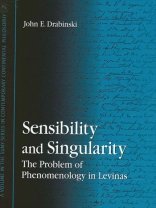Establishes the importance of Husserl’s phenomenology for Levinas’s ethics.
Is Emmanuel Levinas a dismissive critic of Husserlian phenomenology, or an important member of its movement? The standard account of Levinas’s work assumes his distance from Husserl. In opposition to this account, Sensibility and Singularity contends that Husserl was a vital, living resource for Levinas throughout his philosophical career. The singularity of the Other is the centerpiece of Levinas’s thought. The philosophical significance of this singularity, however, cannot be fully appreciated without attending to Levinas’s transformation of the Husserlian themes of time, materiality, intentionality, and sense. This book documents those transformations and establishes their centrality to Levinas’s notion of ethics. What emerges from this reading is a thorough account of Levinas’s constant and productive debate with the Husserlian tradition of phenomenology.
Table des matières
Acknowledgments
List of Abbreviations
Introduction
1. Unsuspected Horizons: On the Husserl Question
2. The Subject outside Itself: Transcendence and Materiality in the 1940s and 1950s
3. The Subject in Question: Relation and Sense in Totality and Infinity
4. Sensation, Trace, Enigma: Rethinking Sensibility in the 1960s
5. Impressions of Sense: Materiality in Otherwise than Being
Notes
Selected Bibliography
Index
A propos de l’auteur
John E. Drabinski is Visiting Assistant Professor of Philosophy at Grand Valley State University, Michigan.












